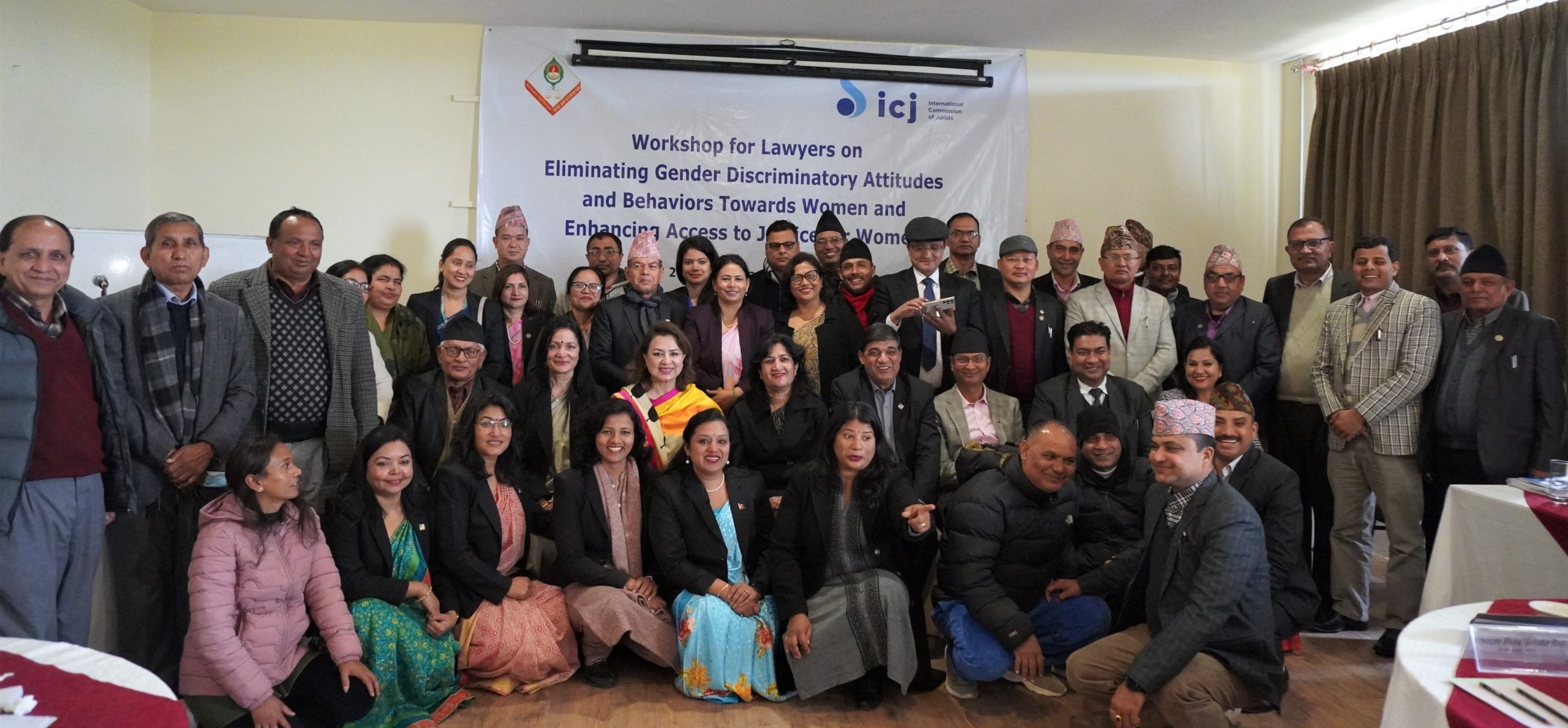At a workshop for lawyers focusing on the Elimination of Gender Discriminatory Attitudes and Behaviors Towards Women and Enhancing Access to Justice for Women organized by the International Commission of Jurists (ICJ), in collaboration with Nepal Bar Association (NBA), participating legal practitioners agreed that gender stereotypes and gender discriminatory behaviors pose major barriers for women who are in their quest to access justice.
The participants evaluated the difficulties women are facing in the administration of justice and considered the role of individual lawyers and NBA should play in taking positive steps to facilitate access to justice for women.
The objective of the workshop was to identify gender stereotypical thinking and discriminatory practices in the Nepalese justice system and legal profession to formulate strategies to eliminate those attitudes to enhance access to justice for women.
38 practitioners from Chitwan, Makwanpur, Nawalpur, Nawalparasi, Gorkha, Dhading, Lamjung and Tanahu Districts discussed the standards contained in the Convention on the Elimination of Discrimination against Women (CEDAW) and highlighted how gender stereotyping and gender bias in the justice system hinders women’s full enjoyment of their human rights.
The ICJ Commissioner and former Chief Justice of the Supreme Court of Nepal, Justice Kalyan Shrestha, in his opening remarks, stressed that lawyers and the judiciary have a critical responsibility to challenge the negative impact of gender stereotypical behaviors towards women and facilitate access to justice for women.
Bandana Rana, Member of UN CEDAW Committee, said gender stereotyping is a ‘root cause’ of violence against women and appealed to the lawyers in attendance to play a key role to end harmful gender stereotyping in the course of their work.
Former Minister for Law, Justice and Parliamentary Affairs and Senior Advocate, Govinda Prasad Sharma, emphasized the need for stronger coordination between the NBA, Office of the Attorney General and the Law Ministry to provide effective legal aid services to the victims and asked the NBA to continue advocacy for the endorsement of the Integrated Legal Aid Policy in the current session of the parliament to streamline effective legal aid services.
Advocate Laxmi Pokharel, ICJ Nepal Legal Adviser gave an overview of the Bangkok General Guidelines (BGG) on applying a gender perspective in South and Southeast Asia and highlighted the role of lawyers in implementing the BGG to ensure a more women friendly administration of justice. She said the major objective of the program under the Access to Justice project is to enhance the capacity of justice actors, including judges and lawyers, to “eliminate gender discriminatory behaviors and unconscious bias towards women and to create a conducive environment for women so that they can knock the door of institutions concerned for justice if needed.”
Senior Advocate Gopal Krishna Ghimire, President of NBA, expressed his commitment to make the legal aid service more effective and do advocacy to the authority concerned to create a more favourable environment for women to seek justice.
Senior Advocate Professor Geeta Pathak Sangroula highlighted the principle of CEDAW and the State obligations to respect, protect and fulfill women’s human rights and ensure access to justice for women.
A panel of experts led the workshop, including, Bandana Rana, Member, UN CEDAW Committee; Senior Advocate Prof. Geeta Pathak Sangroula, member, Supreme Court Bar Association; Senior Advocate and Prof. Dr. Shashi Kumari Adhikari, member, Supreme Court Bar Association; Senior advocate Yadu Nath Khanal; member, Supreme Court Bar Association, Advocate Indu Koirala, former member, Nepal Bar Association, advocate Pravakar Shrestha, member, Supreme Court Bar Association, Advocate Bishnu Bashyal, member Supreme Court Bar Association, and Advocate Pundevi Maharjan, member, Supreme Court Bar Association.
The participants agreed on the need to increase legal awareness to the general public about their rights and to provide information about institutions concerned where a victim can seek redress if they face injustice, including discrimination. Furthermore, they urged the government of Nepal and NBA to strengthen the free legal aid services, including pro-bono services, and suggested that the NBA use social media to disseminate messages to the general public to break existing barriers on accessing justice.
“I am a user of social media and I feel that NBA needs to be more visible to the people through messaging in social media about free legal aid service, victim support system and women’s rights guaranteed by the CEDAW and Nepalese law. This workshop has triggered us about the role of lawyers on creating an enabling environment for women in accessing justice,” said Advocate Shyam Raj Ghimire from Nawalparasi District Court Bar Association.
The workshop held in Chitwan on 20 and 21 January 2023 was organized under the ‘Enhancing Access to justice for women in Asia and the Pacific’ project funded by the Swedish International Development Cooperation Agency (SIDA) and implemented jointly with UN Women and The Office of the High Commission for Human Rights
Contact
Kaajal Ramjathan-Keogh – Lead, Women’s Access to Justice Project, International Commission of Jurists, t: +27 84 514 8039 e: Kaajal.Keogh@icj.org
Laxmi Pokharel, National Legal Adviser International Commission of Jurists, t: +9779851047588, e: laxmi.pokharel@icj.org




